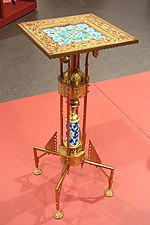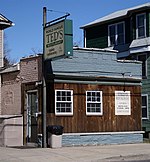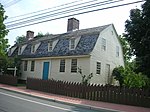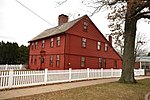Curtis Memorial Library
Buildings and structures in Meriden, ConnecticutLibraries in New Haven County, ConnecticutLibraries on the National Register of Historic Places in ConnecticutLibrary buildings completed in 1903National Register of Historic Places in New Haven County, Connecticut ... and 1 more
Public libraries in Connecticut

The Curtis Memorial Library, now the Augusta Curtis Cultural Center, is a historic former library building at 175 East Main Street in Meriden, Connecticut. It was designed by New Haven architect Richard Williams in the Classical Revival style, and was completed in 1903. The building was a gift to the city from Augusta Munson Curtis in honor of her husband George, who was one of the city's leading businessmen and onetime mayor. It was listed on the National Register of Historic Places in 1981.
Excerpt from the Wikipedia article Curtis Memorial Library (License: CC BY-SA 3.0, Authors, Images).Curtis Memorial Library
East Main Street, Meriden
Geographical coordinates (GPS) Address Nearby Places Show on map
Geographical coordinates (GPS)
| Latitude | Longitude |
|---|---|
| N 41.5358 ° | E -72.7973 ° |
Address
Meriden City Hall
East Main Street 142
06450 Meriden
Connecticut, United States
Open on Google Maps









